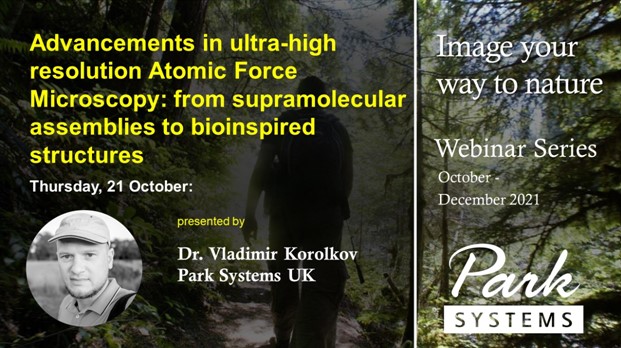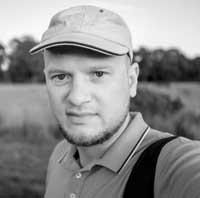
Advancements in ultra-high resolution Atomic Force Microscopy: from supramolecular assemblies to bioinspired structures
Thursday, 21 October, 2021
- 10:00 am – 11:30 am
(GMT)
London, Dublin - 11:00 am – 12:30 pm
(CET)
Berlin, Paris, Rome - 18:00pm – 19:30 pm
[UTC+9]
Seoul, Tokyo

Understanding the structure-property relationship is a key in designing new
materials or improving the current ones. This is equally important from constructing new tyres to developing
antifouling biomedical surfaces. The core problem remains the same. Scientists need to understand the
exquisite hierarchical architecture of various materials on both atomic, molecular and supramolecular levels.
And they do need to measure functional properties on the very same scales. Such combined knowledge provides an
ultimate holistic approach for material characterization.
When it comes to precise measurements of structure and properties on a nanoscale and beyond, there is very
little competition to Atomic Force Microscopy. It is the only technique capable of real-space
ultra-high-resolution imaging in almost any environment and temperature range. And the key to this is a sharp
probe that interacts with samples on a subnanometer scale providing both the structural and functional
information.
In this webinar, I will focus on the recent advancement in ultra-high resolution imaging on large sample
Atomic Force Microscopes. I will cover three main topics to highlight recent developments in using Park
System’s AFMs in investigating supramolecular assemblies on surfaces, assessing the structure and
nanomechanical properties of real-world polymers and, for the first time, understanding the molecular
structure of peptide nanotubes. The latter will be combined with high-resolution nanomechanical measurements.

Presented By :
Dr. Vladimir Korolkov, Senior Application Scientist at Park
Systems UK
Vladimir received his PhD in Chemistry from Moscow University in 2008. Then, he moved to the University of Heidelberg and specialized in X-ray photoelectron spectroscopy of thin films, following by the position at the University of Nottingham, where he discovered his passion for Scanning Probe Microscopy (SPM), and became a strong advocate of SPM techniques to unlock structure and properties at nanoscale. He pioneered the use of higher eigenmodes of standard cantilevers to routinely achieve resolution that was previously thought to be exclusively limited to STM and UHV-STM. Vladimir published more than 40 scientific papers, including three in Nature family journals. He left academia in 2018 to contribute to the industrial site of SPM technology.




